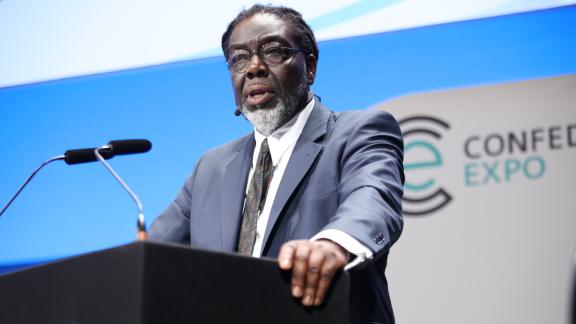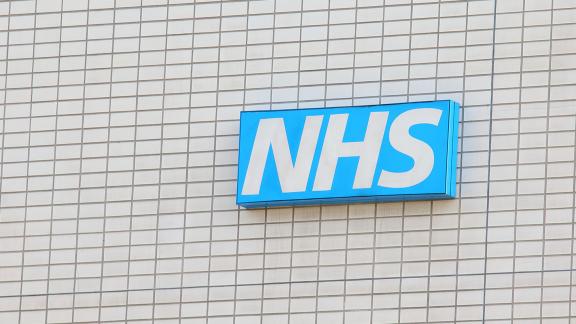Lord Victor Adebowale's speech at NHS ConfedExpo

Good morning.
On behalf of the board of trustees and staff of the NHS Confederation, I would like to welcome you to NHSConfedExpo – our joint annual conference with NHS England.
For those who don’t know me I’m Victor Adebowale, chair of NHS Confederation, and it’s my pleasure to host you all for the next two days.
I am particularly pleased to be in Manchester – the jewel of the North – and to welcome partners from across the health and care system; from local government, social care, housing associations, and from voluntary, community and social enterprise organisations.
‘We are partners’
Last year there was a mantra of ‘we are the NHS’ but this year surely it’s, ‘we are partners’ as we strive to achieve true integration.
I am pleased that over 5,000 of you have come here to be encouraged and inspired. I want to thank our sponsors, Google Health and Accurx, for supporting us to make this happen.
I am hoping that it’s going to be a significant time for us all as we head towards some really important milestones. We mark 75 years of the NHS in July, and there are plenty of sessions here for us to engage in. We also mark 75 years since HMT Empire Windrush arrived in Britain, bringing thousands of people who formed the bedrock of our NHS workforce. Yes, dates to greet with thanks for their achievements, but poignant dates too, as we reflect on their experiences.
I also want to acknowledge the position we find ourselves in this morning. We have colleagues, our junior doctors, on the picket lines again. For many the decision to strike has been a tough one to take, and we know there are colleagues who are not here in order to help cover.
So I think the best way we can acknowledge their efforts, is by working, learning, being inspired, encouraging one another, and going back to our organisations as better leaders.
And please, feel you can greet colleagues with a smile, and yes, last time I looked you were allowed a drink after work. I must also thank my Confed colleagues too who have worked hard to ensure we could still meet in this way.
Lobbied, shaped and supported
Last year was our first post-lockdown conference, and I recognised the mammoth efforts you made to get the country through the pandemic. I feel it’s time for me to thank you again, so thank you, because in talking to many of you recently, this year feels even tougher, doesn’t it?
But much has happened in a year, and we at the NHS Confederation have been working hard on your behalf. We have lobbied for a much-needed workforce plan which the government committed to publishing this year – yes we’re still waiting and yes, we’re keeping the pressure on!
We have sought to shape the debate around devolution and the evolving relationship between the centre and integrated care systems, both through Professor Chris Ham’s report and Patricia Hewitt’s ICS review.
And we’ve supported you through NHS Employers by developing comprehensive guidance to help you to face industrial action, while continually urging both the government and unions to resolve the ongoing disputes.
The difficult issues we face
So yes, ConfedExpo is an opportunity to refocus, but I want us to challenge ourselves, and talk about some of the really difficult issues we face.
Yes, it’s going to be uncomfortable. Some of these issues are uncomfortable. But if we are not feeling uncomfortable then we’re not trying hard enough.
Because the future is decided by the things we don’t discuss. Challenges can feel unsurmountable at times. However, there are some challenges that we are only going to solve if we solve them together. Few problems are solved by one person alone.
It’s only by having difficult conversations that we can change things – we change the conversation, we change the action. I have noticed the NHS often changes the language but doesn’t always follow through on the change in behaviour. Actions speak louder than words.
You might ask, what are the difficult conversations we could have?
A safe staff equals a safe working environment
Firstly, how we value our people, because the truth is, we are not. According to the last NHS Staff Survey, a third of staff say they feel burnt out because of work. Burnt out. Nothing left in the tank.
Too many of our colleagues suffer discrimination, bullying and harassment. The WRES 2023 data has shown clearly the increase in BME staff receiving harassment and abuse. We are only just starting to tackle discrimination against people with disabilities and people from LGBTQ+ communities. Our data must improve and we must act on it.
No amount of abuse is tolerable, yet we are tolerating it. And let me be clear – there is no hierarchy of oppression. So when it comes to my LGBTQplus colleagues, we stand for people being able to bring their whole selves to work, and I will never apologise for standing in solidarity with them. A safe staff equals a safe working environment.
On top of the emotional, psychological cost to individuals, there’s huge financial cost. The consequences of bullying and harassment in the NHS cost the service in England at least £2.28 billion. £2.28 billion. When did we decide this was an acceptable way to spend money?
Achieving the change we want to see
Things can change, and there is hope
But this will only stop if we talk about it together. But I want to be clear – things can change, and there is hope. I’m saying this to help us all achieve the change we want to see.
We need a workforce that people want to join and stay part of. Data from NHS Digital shows that 15,000 nurses resigned from the health service in the year to March 2022, with 4,000 citing work-life balance as their reason for leaving. Staff across the NHS are now three times more likely to quit due to issues of work-life balance than they were a decade ago.
We want a strong, safe, diverse and valued workforce, and I welcome last week’s publication by NHS England of their EDI improvement plan – but we need to offer critique to each other. We need to talk about how this will be delivered. It’s not about how we write things, it’s how we do things. But I want to go further as to why it’s vital to patients and citizens that we talk about these difficult issues.
Reducing inequalities benefits everyone
We need a workforce that reflects the communities we serve because that’s part of how we will tackle the deepest health inequities, and because the NHS workforce IS the community.
A strong, safe, diverse, valued workforce is a key part of our prevention work.
And for me there is no place for any perception that tackling inequality is an add on. Reducing inequalities benefits everyone.
There is strong evidence that where an NHS workforce is representative of the community that it serves, patient care and the overall patient experience is more personalised and improves.
The MEWS model, which stands for Multilingual Emotional Wellbeing service, in the Royal Borough of Kensington and Chelsea, is one example. It proactively addressed inequalities in healthcare with approved VCS support workers providing one-to-one sessions, who understood both language and cultural barriers. Over three years they reached BME people experiencing emotional and mental difficulties which led to 100 per cent of users reporting an improvement in their health, a reduction in use of secondary care and for every pound spent, £3.20 in attributable value was gained.
An ICB-led an HSJ award-winning communications campaign that led to a huge increase in COVID-19 vaccination levels among BME groups. The communications director responsible says that work would probably not have been happened if it wasn’t for the fact that she herself was from a minority ethnic background – highlighting the need for diversity among senior leaders.
Knowing what good looks like
Which brings me on to leadership itself – we’re all leaders here, so where in all this do we hold our leadership practice to account?
Do we know what good looks like in order to have healthy communities and healthy systems? Do we know what good looks like in delivering population health?
That’s why we offer numerous leadership development opportunities to help our members become better leaders, leading everyone, everywhere, all the time. And are we having the difficult conversations about what kinds of leaders we need to be now we work as health and care systems? Sometimes it feels as if we are working against each other, fighting turf wars, how do we address that? Colleagues, we are all the system. We are all system leaders.
Look, we know leadership is hard. I don’t envy the job my friends Richard or Amanda have in leading NHS England. It’s tough and I support them 100 per cent. But I also see the role we all have in helping articulate what the centre could look like in order to make the whole system work better. Colleagues, we get the leadership we deserve. So let’s have the conversation about what we need from the centre and what the centre needs from us.
Gritty issues
Because there aren’t easy answers...The answer cannot only be more acute beds, even though we are still not at the European average. How do we achieve a social care system that works for everyone? We have an overwhelmed primary care service, mental health service, community service. We are reliant on VCSE colleagues – how do we better include them, and how do we, together, as Matthew will say more about, build a new social contract and reset the relationship between the public and its NHS and social care system?
No easy answers, but let’s have everyone in the room in those conversations, and let’s get stuck into other really gritty issues – are we talking enough about the parity of esteem so that people with complex mental health issues get equal access to health services as people with physical needs?
Are we really engaged enough on the big debates? How do we prevent a two-tier system? What are the really hard conversations we sometimes avoid?
Looking to the future
Let’s get them out in the open, because as I say, the future is decided by the things we don’t discuss.
I want to end by saying again that I am so pleased you’re here and I’m looking forward to what I too can learn from you.
When I look at you, when I talk to you, it gives me confidence that the NHS will be here in 75 years' time, used by the public, respected by our communities and colleagues who are the public.
For so many of you this was never just a job, it’s a vocation. So let’s tune in to how we make the most of that calling. Please, get talking, have those tough conversations, help us solve the big issues together. And now I’d like to hand over to my colleague Richard Meddings, chair of NHS England, who will speak before we hear from the most inspirational Mr George Webster.



